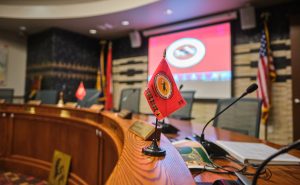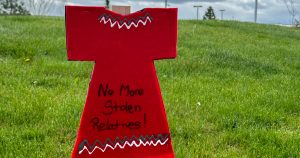MISSION – The Confederated Tribes of the Umatilla Indian Reservation (CTUIR) proudly announce the publication of a scientific study unveiling the discovery of an ancient cat species that has been named in the Cayuse language to acknowledge its ties to the Tribes’ homeland.
Tamástslikt Cultural Institute collaborated with Professor John Orcutt of Gonzaga University and Professor Jonathan Calede of the Ohio State University to name the new species in the ancient language of Cayuse. The published paper of their findings on the ancient cat fossil reveals the new name: Machairodus lahayishupup (pronounced Meh-CHI-rho-duss Leh-HIGH-ees-hoop-oop). In the old Cayuse language, laháyis húpup means “ancient wild cat.”
The fossils were found in the ancestral Cayuse homeland over six decades ago. In recognition of its origin, Orcutt and Calede wanted the name of the new species to reflect its home environ. The newly identified cat weighed an average of 600 pounds and could have managed to kill prey weighing up to 6,000 pounds, the scientists estimate, suggesting that their findings provide evidence of some of the largest big cats in Earth history.
The paper, released April 29, 2021, in the Journal of Mammalian Evolution, reveals the newly identified saber-toothed cat species as one of the largest in history. It roamed North America between five and nine million years ago. Machairodus is a genus of large saber-toothed cats that lived in Africa, Eurasia and North America.
The two professors first approached Tamástslikt in the spring of 2020 with the request to provide a native name. A team from Tamástslikt, utilizing linguistic research contributed by Dr. Phillip Cash Cash, Weyíiletpuu (Cayuse), decided that the name should be derived from the ancient Cayuse language.
“The discovery of an ancient species on ancestral Weyíiletpuu (Cayuse) lands is a profoundly significant event. The naming of the new species of saber-toothed cat is culturally significant for the resident ancient cat, the Old Cayuse language, and the local CTUIR community, not to mention to the world of paleontology,” said Dr. Phillip Cash Cash.
At a later date, the Tribe will identify an opportunity to honor the two professors who studied the big cat that came from the CTUIR homeland.



